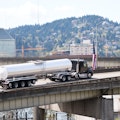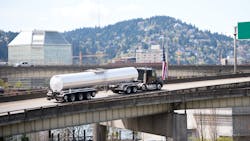If you live in a region with tolls on roads, bridges, or lanes, you likely have observed rate hikes over the past year or beyond. This is not a localized occurrence; there has been a nationwide trend of increasing toll rates.
Some areas have seen an 8.8% increase in transponder rates over the past year, with an average increase of around 5%. And this trend will continue going into next year. Major toll agencies, including Chicago Skyway, Pennsylvania Turnpike Commission, Bay Area Toll Authority, and the New York Thruway Authority have announced toll increases that will go into effect in 2024. Depending on where your company is located and the frequency your drivers use tolls, this can have a noticeable effect on your bottom line.
So why is it that we’ve seen a widespread uptick in toll rates and more increases than we’re typically used to in any given year? Without getting too much into the weeds, there are several causes, with many of them directly and indirectly due to the pandemic.
Reduced traffic volume
Thank you, pandemic: Tolls are catching up from lost revenue.
Back in 2020 it seemed like no one was on the road and you could drive during peak travel hours with no traffic. Lockdowns and a shift to a work-from-home model for many companies in response to the pandemic were responsible for that. While it was a benefit for those using our roadways, for tolling authorities, it had a significant impact on its cash reserves. While COVID-19 no longer has an impact on daily life like it once did, the ripple effects from the pandemic are still felt. Many companies have adopted a permanent or hybrid work from home model since the pandemic, and while traffic volumes have certainly picked back up, they still lag behind pre-pandemic levels. To make up for the difference in lost traffic volumes and to replenish depleted cash reserves, tolling authorities have needed to raise toll rates to fund vital infrastructure projects.
Increasing inflation, rising interest rates
Since the pandemic, something we’ve all felt is the increasing cost of living brought on by inflation and rising interest rates. Every time we go to the grocery store, fill up our car’s gas tank, dine out or look to finance a home or vehicle, it’s noticed. Because of this, the cost to build or repair our infrastructure is also impacted. Building materials are more expensive and labor costs are also on the rise. Labor union strikes have been increasingly common in recent years as workers seek out better wages to keep up with inflation and many contractors are preemptively increasing employee wages to better retain employees. The end result is that these labor and material cost increases are baked into the total cost of a building project.
While other issues have an impact, traffic volume, inflation and interest rates are playing a key role in why tolling authorities are increasing rates to offset and fund much needed infrastructure projects.
New toll sites coming soon
Regardless of your view on tolls, they are effective in generating revenue to pay for major projects. There are several new toll bridges and lanes that will be established in the next few years that may impact your operation. Here’s where those new tolls will be and when they’re expected to open.
- Belle Chasse Bridge in New Orleans: Expected to be live Q2 2024
- Gordie Howe International Bridge (connects Detroit and Windsor, Ontario): Expected to be live Q4 2024
- New Choice/Express Lanes in Tennessee: Expected to be live Q3 2025
- Manhattan, New York Congestion Pricing: Expected to be live Q4 2025
- California Otay Mesa II: Expected to be live Q4 2026
Mitigating toll challenges
For many trucking companies that deal with tolls on a regular basis, the costs associated, and time spent managing toll bills or accounts, is simply a cost of doing business. They may try to avoid them because either they don’t have an account with the tolling authority and didn’t want to receive a bill in the mail and manually pay the fee or they want to save money by taking an alternative route, which often creates more problems than it solves. With the cost of diesel high and expectations from customers that deliveries will be completed within a specific window of time; efficient routing is key to reducing fuel costs and supporting on-time deliveries. That often means taking roads or bridges with tolls.
If you currently manage accounts with tolling authorities or pay toll bills individually as they come in on your own, there is a simpler solution that also allows you to receive the best possible toll rates available. When you work with a toll management provider, your vehicles receive even better rates than what you can get when you register vehicles directly with a tolling authority. That’s because toll management providers are the tolling authority’s largest customers due to the number of vehicles in their network, and they receive discounted rates because of it. The toll management provider then passes those discounts directly to its customers. In fact, some of our customers can get up to a 60% discount on toll rates. Depending on how many vehicles are in your fleet and toll usage rates, those savings can add up quickly. Plus, using toll management services simplifies the back-end management of tolls and makes it easier to bill back customers for toll costs incurred along their route.
In a landscape where toll rates are on the rise nationwide, using toll management services to secure the best possible rates each time you use tolls can reduce the impact to your bottom line while also alleviating the many pain points that come with managing tolls on your own.
Jason Walker is chief revenue officer at Bestpass, a provider of toll payment and management solutions for commercial fleets and owner operators.
About the Author

Jason Walker
Bestpass chief revenue officer
Jason Walker is chief revenue officer at Bestpass, a leader in toll payment and management solutions for commercial fleets and owner operators. In this role, Walker oversees the sales and marketing teams and supports revenue management functions. Walker joined Bestpass in 2022 with more than 10 years of experience in the trucking industry and 25 years of experience driving results across multiple industries and SaaS companies.
